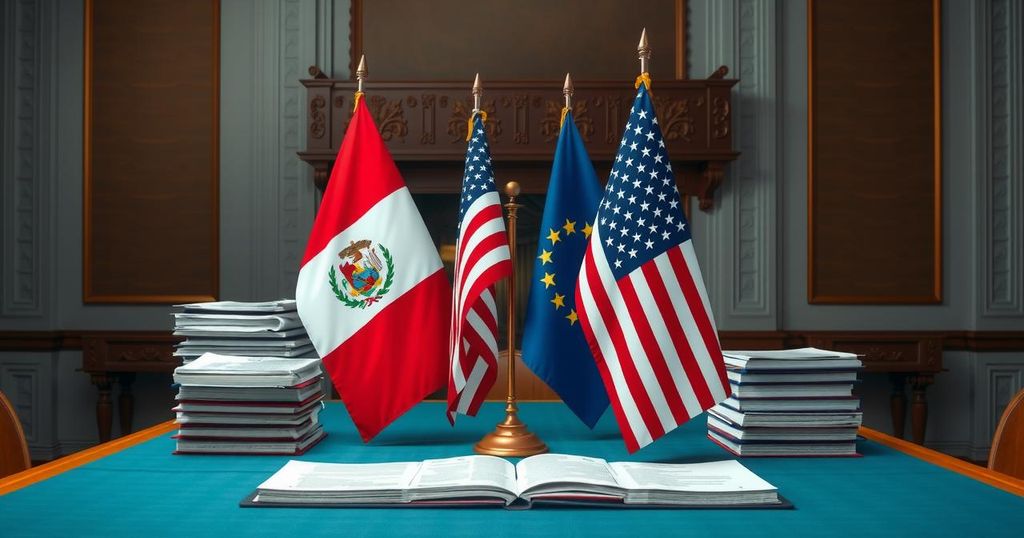World news
ABC NEWS, ABREGO GARCIA, ASIA, BRAZIL, BUKELE, CNN, DISTRICT COURT, EL SALVADOR, HONOLULU, JUDICIARY, JUSTICE DEPARTMENT, LAW, MAN, MARYLAND, NAY, NEW YORK TIMES, NORTH AMERICA, PHILIPPINES, POLITICS, SALVADOR, SOUTH AMERICA, SUPREME COURT RULING, TRUMP, TRUMP ADMINISTRATION, U. S, U. S. DISTRICT COURT, UNITED STATES, WASHINGTON, WHITE HOUSE
Stella Nguyen
0 Comments
Trump Addresses Deportation Case of Kilmar Abrego Garcia Amid Criticism
President Trump claims not to have spoken with El Salvador about the return of Kilmar Abrego Garcia, who was mistakenly deported. Secretary of State Rubio remains tight-lipped on contacts with Salvadoran leaders, and legal experts express concerns over constitutional rights. Trump’s administration continues to face scrutiny over immigration policies as the situation evolves.
President Donald Trump recently stated that he has not communicated with El Salvador’s President Nayib Bukele regarding the return of a man mistakenly deported from the United States. Specifically, Kilmar Abrego Garcia was wrongfully sent back to El Salvador, despite holding a protective order to stay in the U.S. The President commented on the situation during a press conference, saying, “I don’t know. I haven’t spoken to him.”
In an interview with ABC News, Trump claimed he could help facilitate Garcia’s return with a simple phone call, yet emphasized that he prefers to leave the matter in the hands of legal professionals. Trump’s administration contended that only El Salvador has the authority to act on the case. Furthermore, a U.S. Supreme Court order from April 10 mandated the administration to facilitate Garcia’s release. However, Bukele indicated he would not consent to this return during a meeting with Trump.
Today, CNN reported that Secretary of State Marco Rubio has been in touch with Bukele about the case. Still, Rubio declined to comment on the specifics when pressed during a cabinet meeting with Trump, stating, “The conduct of our foreign policy belongs to the President of the United States and the executive branch, not some judge.” He reiterated that he would not disclose details of the communications.
Requests for comments from representatives of the U.S. Department of Homeland Security and El Salvador’s presidential office regarding these reported contacts were met with silence. Meanwhile, the U.S. District Court in Maryland ordered expedited actions in Garcia’s case, signaling urgency as attorneys prepare for mid-May.
Kilmar Abrego Garcia, a 29-year-old Salvadoran migrant, was living in Maryland under a work permit before immigrations officials detained him in March. Allegedly questioned about gang associations, he was deported despite being protected by an earlier court order. Legal experts and members of Congress, particularly Democrats, argue that this scenario underscores significant risks to constitutional rights and due process for immigrants.
The White House has made unproven claims that Garcia is affiliated with the MS-13 gang, which the administration has categorized as a foreign terrorist group. Garcia’s legal team firmly denies these allegations, asserting that he fled El Salvador at age 16 to escape violence and was awarded a protective order in 2019.
Senator Chris Van Hollen, a Maryland Democrat, emphasized the broader implications of this situation, stating, “If Donald Trump can ignore court orders and trample over the rights of one man, he threatens the rights of everyone who lives in the United States of America.” This comes as Trump marks his 100th day in office and continues to push his immigration agenda, although public opinion on his handling of immigration remains divided. Reuters/Ipsos polling reflected mixed feelings among respondents, while a separate poll showed a preference for Garcia’s return.
Lawyers representing other migrants deported during the same March flights have echoed calls for judicial intervention to facilitate their clients’ returns. Lastly, during the press briefing, Rubio revealed that the Trump administration is exploring arrangements with other nations for the repatriation of deported migrants, mentioning a recent agreement with Uzbekistan. In a related court ruling, a judge mandated that the administration guarantee due process for migrants detained at Guantanamo Bay.
In summary, President Trump faces pressure over the case of Kilmar Abrego Garcia, a man wrongfully deported to El Salvador, amid claims of miscommunication and potential constitutional violations. The administration’s reluctance to address this issue directly raises further questions regarding due process and the handling of immigration in the Trump era. As new developments unfold, all eyes remain on how this will affect U.S.-El Salvador relations and the future of impacted migrants.
Original Source: www.staradvertiser.com




Post Comment